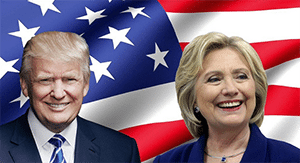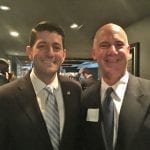 Looking for a breakdown of where the presidential candidates stand on substantive issues? As the 2016 campaign enters its final stretch, Shawn McBurney, the Society of American Florists’ senior director of government relations, and Drew Gruenburg, SAF’s chief operating officer, who oversees SAF’s government relations efforts, offered to share their perspective on how the candidates plan to approach industry-related issues.
Looking for a breakdown of where the presidential candidates stand on substantive issues? As the 2016 campaign enters its final stretch, Shawn McBurney, the Society of American Florists’ senior director of government relations, and Drew Gruenburg, SAF’s chief operating officer, who oversees SAF’s government relations efforts, offered to share their perspective on how the candidates plan to approach industry-related issues.
“In some instances, details are sketchy,” McBurney acknowledged, “but in the coming weeks, both candidates will offer more specifics as they try to reach voters across the country.”
Health Care
Hillary Clinton defends the Affordable Care Act (ACA) and has stated her support of a “public option” in the ACA. She has also called for doubling funding for primary-care services at community health centers, and tripling the size of the National Health Service Corps, a federal organization offering financial and other support to primary care providers in underserved communities since 1972. In exchange, the providers are given either loan repayment or scholarships throughout their medical education.
Donald Trump has expressed his desire to repeal the ACA. He has called for individual deductions for health care expenses, tax-free treatment of health savings accounts (HSAs), modifying laws so that health insurance can be sold across state lines and other changes.
Taxes
Clinton would enact a number of tax policies that would raise taxes on individual and business income as well as increase taxes on estate and gift taxes. Her plan would raise taxes by $1.1 trillion over 10 years. In addition, she would provide tax credits for businesses that invest in community development and those that hire apprentices or share profits with employees.
Trump would lower the top income tax rate to 25 percent, reduce the corporate tax rate to 15 percent, eliminate federal estate and gift taxes, and significantly increase the standard individual deduction. The increased standard deduction would remove millions of taxpayers from federal income tax rolls. Estimates show that tax reductions would amount to $9.5 billion over ten years. His proposals also include the repeal of most tax deductions for businesses.
Labor
Secretary Clinton has supported raising the federal minimum wage to $12 per hour and also supports efforts to increase state and local minimum wages to $15 per hour. She has also called for increased unionization and highlighted her original co-sponsorship of the “Employee Free Choice Act” (Card Check) when she served in the Senate. Clinton supports mandated equal pay and guaranteed paid leave.
Trump’s positions on specific aspects of labor policy are vague. He has made several different statements on his views on the federal minimum wage and has stated that policies on trade and taxes will “lead to an explosion of new jobs, wealth and opportunity.”
Environmental Regulation
Clinton has made environmental issues a central part of her campaign. She supports President Obama’s climate policy, and has proposed to negotiate a North American Climate Compact with Mexico and Canada that would contain “strong accountability measures to deploy clean energy, reduce energy costs, cut greenhouse gas emissions, guide infrastructure investments, and make our integrated energy and vehicle markets cleaner and more efficient.” While her policy on environment issues is deep, she is silent on the EPA’s Waters of the U.S. rule and pesticide regulation.
While Trump has not specifically mentioned it, a co-chairman of his Agriculture Advisory Committee, Texas Commissioner of Agriculture Sid Miller, said a Trump Administration will tackle the Waters of the U.S. issue, as well as other examples of environmental over-regulation such as the Endangered Species Act and the EPA’s pesticide registration process. On climate change, the Republican candidate says those who raise the alarms on global warming only do so in an effort to raise taxes on industry.
Immigration and Farm Labor
Clinton will push for legislation that will include a pathway to full and equal citizenship. Sources within her campaign say she will support resurrecting the bipartisan “Gang of Eight” Senate Immigration Reform bill negotiated in 2013. During her tenure in the Senate, she cosponsored the Agricultural Job Opportunities, Benefits, and Security (AgJOBS) Act (which SAF supported), which would have streamlined and expanded the H-2A visa program to allow farmworkers who are in the country illegally to become permanent residents through continued agricultural work. Clinton was also a major proponent of the recently passed California State Assembly bill to change overtime rules for farm workers.
Immigration has become a central part of Trump’s campaign, as he has called for mass deportations of illegal immigrants, proposed requiring Mexico to pay for a border wall, and calls for mandating that all employers use E-Verify to check the legal status of new hires. In actual policy terms, his stance is to take a hard line on enforcement of a legal immigration system.
Farm Bill
While in the Senate, Clinton voted for the final version of the 2002 Farm Bill and the veto override of the 2008 Farm Bill. As such, she would likely support research funding for specialty crops including floral and nursery crops that has been part of recent Farm Bills.
Trump has not mentioned Farm Bill programs specifically, but members of his Agriculture Advisory Committee have mentioned that full details of Trump’s Farm Bill proposals will be released when the campaign publishes its full agriculture platform.
Agricultural Advisory Committees
While Clinton does not have a formal agricultural advisory committee, an informal group, Rural for Hillary, has begun work to bolster Democratic support in rural and agricultural areas. The group, not directly affiliated with the Clinton campaign, has been laying groundwork for several months building support and engaging food and agricultural groups. The group is primarily staff driven, but had Secretary of Agriculture Tom Vilsack as a guest speaker at its inaugural meeting last month.
Earlier this month, Trump released a list of 64 individuals who will guide his campaign on agricultural policy, including Senator Pat Roberts (R-Kansas), Representatives Mike Conaway (R-Texas), Rodney Davis (R-Illinois), Robert Aderholt (R-Alabama), and Bob Goodlatte (R-Virginia), and six state Governors: Terry Branstad of Iowa, Sam Brownback of Kansas, Mary Fallin of Oklahoma, Jack Dalrymple of North Dakota, and Dennis Daugaard of South Dakota. Trump’s 64-member ag team is six-times larger than 2012 Republican presidential candidate Mitt Romney’s team, and dwarfs the size of every other Trump advisory team.



